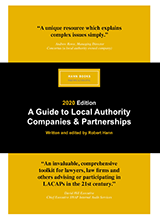Book review: A Guide to Local Authority Companies and Partnerships (‘LACAPs’)

This unique book charts how partnerships, involving local authorities, the private sector and/or the voluntary sector, can be established within the current legal and accounting framework. Kieran McGaughey reviews the text.
This is a book which has been on my radar for some time, so I was delighted to be provided with a copy for review by Local Government Lawyer. The text’s stated aim is to provide an “essential toolkit” for those involved in advising (or indeed, taking part in) LACAPs in the modern era. Given the systematic cuts endured by local government finances, exacerbated by the Covid-19 pandemic, such structures are likely to remain of great interest to local authorities seeking valuable means of income generation.
The first thing I noticed upon receiving the book is its sheer size – some 647 pages long (and those are A4 pages!). So it is certainly not for the faint hearted, rather those with a keen interest in this specialist subject matter. I was concerned beforehand that the book would be a little too “niche”, as the majority of my day-to-day work does not include LACAPs. However, I was reassured to see specific, entire chapters on some of my more “bread and butter” practice areas, such as public procurement and State aid law. And this is not just limited to their application to LACAPs (although helpfully the book covers that also). The broad remit of the book also includes sections on governance, powers, vires etc. As such, there are certainly aspects of this book that will have broader appeal amongst local authority commercial lawyers, regardless of their involvement in LACAPs (Note: Whilst State aid law no longer applies directly to most UK measures post-Brexit, many commentators suggest it continues to act as a useful reference point for compliance with the principles of the EU-UK Trade Agreement).
In terms of doing what it says on the tin, the book does of course contain detailed commentary on charging and trading powers, company law, joint venture legal structures etc. There is a useful blend of both law and practical considerations. The book also has a considerable amount of information on accounting, borrowing and finance. Whilst these are subjects that personally make my eyes glaze over (!), those chapters will no doubt be of wider use beyond the legal team. It is clear that the author, Rob Hann, has effectively been there and done that in the world of LACAPs, which lends credibility to the book. As too does the host of impressive guest contributors, including lawyers from some of the eminent law firms who advise on these matters. I am aware that Rob has a passion for history, which comes through in the book. Rather than just present the reader with the answer, he will guide you through the history, what the answer used to be, and what it is today. Personally I found this interesting though, especially the historical and political context in which the law has developed (and the occasional tension between central and local government!). And those who wish to “cut to the chase” always have the option to just skip a few paragraphs.
The book is, in my opinion, reasonably priced (£150) when assessed against the costs of other specialist legal texts on the market. Especially so if that cost is being split amongst the book being used by several people within an in-house legal team, or law firm. Reviews quoted on the front cover note that the book is “a unique resource” and a “comprehensive toolkit”. It is certainly hard to argue with that - I am not aware of another book on the market which contains such an in-depth and bespoke analysis of this complex area of law.
All in all then, I would certainly recommend this book. In practice some of the chapters are probably only things you will look at where a specific query arises, but you will feel comforted to know you have this aide by your side. Having a copy on your shelf will also certainly add some legal gravitas on your next Zoom call. I just wish I had a copy as a newly qualified solicitor advising on the formation of a joint venture! Readers may also recall that in August last year Grant Thornton issued a much publicised report on governance failings in relation to Robin Hood Energy Limited, a Nottingham City Council owned company. This arrangement brought not only substantial financial losses, but obviously considerable reputational damage for the Council. The stakes remain high then in terms of the setup and governance of LACAPs, perhaps now more so than ever. Having a copy of this book by your side would certainly help to keep your Council on the right path.
Kieran McGaughey is a Commercial Solicitor at Newcastle City Council, and a Director of Lawyers in Local Government (LLG). He is also their National Lead for Partnership & Procurement Law.
For further details or to purchase a copy, please click here.
If you would interested in reviewing books for Local Government Lawyer, please send your contact details and areas of interest to books@localgovernmentlawyer.co.uk

